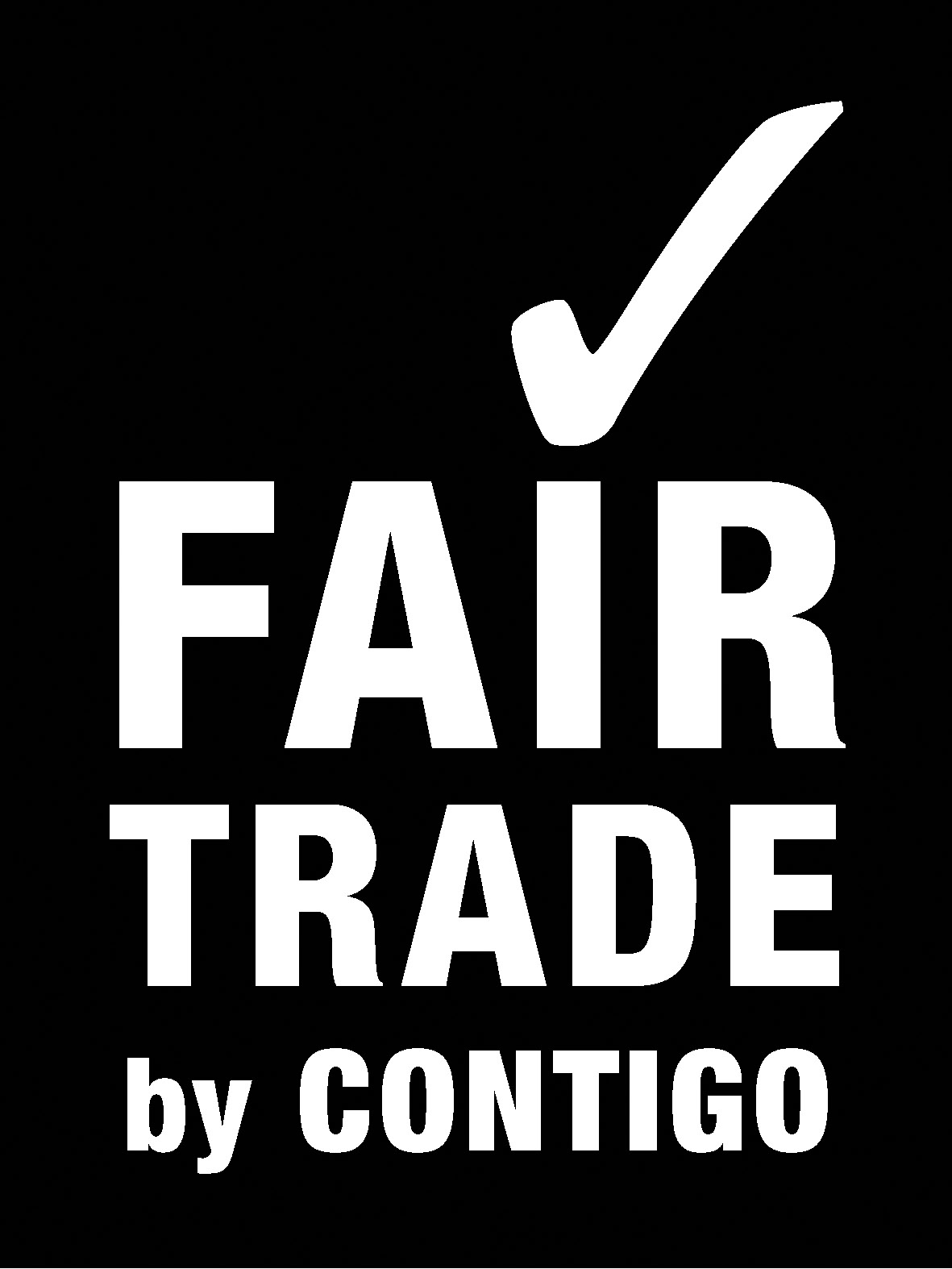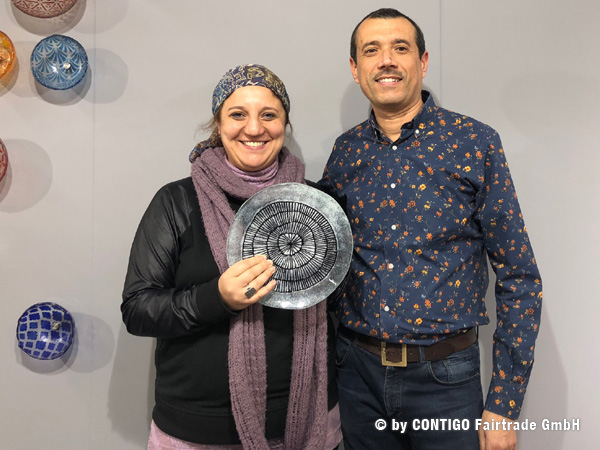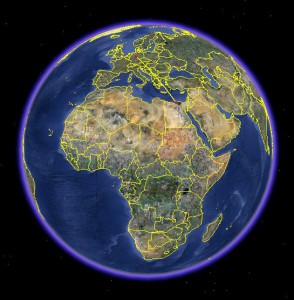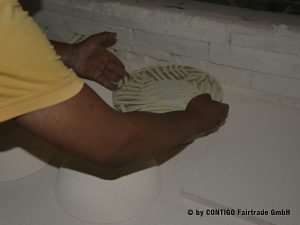Contents
[ hide ]
- 1 Profile of CONTIGO´s partner Glass Style
- 1.1 Supply chain
- 1.2 Products
- 1.3 Location
- 1.4 Founded in 1992
- 1.5 History
- 1.6 Cooperation with CONTIGO since 2018
- 1.7 Structure of the business
- 1.8 Sales
- 1.9 Goals
- 2 Fairtrade classification
- 3 Fairtrade aspects
- 3.1 No child labour
- 3.2 No discrimination
- 3.3 Fair wages
- 3.4 Humane working conditions
- 3.5 Transparency
- 4 Monitoring
- 5 Country information
This trade relationship is currently not active. (Status of 2024)
Profile of CONTIGO´s partner Glass Style
Supply chain
- Trade partner: Glass Style, microenterprise
- Function: producer
- Structure: own production facility
- Distribution: direct import CONTIGO
Products
Handmade tableware and home decorations made of glass
Location
Showroom: Cairo, quarter Heliopolis, Egypt – distance to Europe: 3,000km
Production / workshop: Cairo, quarter Ain Shams, Egypt – distance to Europe: 3,000km
Founded in 1992
History
- Walid Onsy is a glass artist and professor at the faculty of Applied Arts in Cairo. He is well known and attends many national and international exhibitions
- 1992: Foundation of a studio for handmade glass art in “Fusing” technique, at the beginning in the range of room decorations. Walid Onsy developed the glass melting process himself
- 2002: Restructuring and expansion of the studio, specialisation in functional and artistic glassware and objects such as statues, lamps, glass windows
- Since 2010: Focus on export by participating in various trade fairs, new international customers can be won
Cooperation with CONTIGO since 2018
Why does CONTIGO with Glass Style:
At Glass Style we appreciate the dedication to craftsmanship as well as the focus on utility and sophisticated design. The Onsy / Bahaa couple has proven to be a committed partner, perfectly taking on board our ideas and putting them into practice.
Structure of the business
Number of employees:
- Management: Walid Onsy and his wife Suzan Bahaa
- 19 full time employees (11 women, 8 men)
- 12 permanent employees in production and quality control: men are responsible for cutting and sanding the glass, women for design work (painting)
- 2 management (see above) und 1 senior designer
- 4 employees for sales and marketing
- All employees can be employed all year round
Organisation of workforce:
All production steps are completed in their own workshop in Ain Shams.
Work environment and equipment:
Light, clean, well air-conditioned and organised workshop. The workshop and office rooms in two neighbouring houses extend over several floors:
- Two rooms for electric melting furnaces
- Office floor for administration, design and sales
- One floor with several workrooms for the manual processing of the glass (see below “Work steps”)
- Packaging and storage
Glass Style is the only workshop in Egypt with a melting furnace for large products.
- Material: simple, non-recycled glass plates with a thickness of 3-8 mm; either only one layer of glass is used or two layers of glass are fused together
- Production of raw glass moulds from refractory material can be used between 150 and 300 times
- Cleaning of the glass
- Cutting of the glass according to the planned shape (by machine or by hand, depending on the shape)
- Colouring of the glass: coloured powdered glass is placed between two glass plates. Due to the heat, the powder melts and forms a large-area colour texture
- Painting of the glass: designs are hand-painted with food-safe colours
- Preparation of the melting process by adding a glass separating substance (kaolin, white clay) to the mould to prevent the glass from sticking to the mould during the melting process
- Furnace melting (between 800 and 880 degrees) between 8 and 10 hours
- Cooling of the glass to avoid cracking takes another 24 hours
- Finishing processes, e.g. cleaning, grinding or polishing, so that the end product becomes transparent, semi-transparent or covered
- Quality control
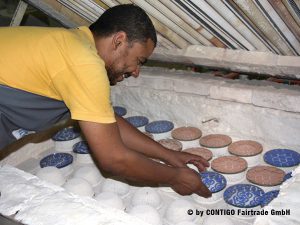
Sales
- Exports (40%) to Europe, Middle-East and the U.S.
- Home market (60%), amongst others: sales via their own gallery, hotels, public institutions
Goals
- To further develop the Egyptian glass craft and to preserve a centuries-old cultural asset
- To move to a larger production site with better equipment
Fairtrade classification
FTA = Fairtrade Approved
Fairtrade aspects
Glass Style complies with the following Fairtrade Principles:
No child labour
No discrimination
No discrimination due to gender, disability, religion, ethnicity, sexual orientation, political orientation, or infection with HIV
Fair wages
- Minimum wage in Cairo (handicraft sector): EGP 1,200/month (EGP=Egyptian Pound)
- Fixed salaries at Glass Style:
- EGP 2,000 – 2,500/month for un-skilled employees (in the training and induction phase)
- EGP 3,500 – 4,500/month for skilled employees
- Salaries are paid out in cash monthly
- Bonus payments
- Annual bonus: 15% of the monthly salary is paid out as a bonus per quarter
- Holiday bonus
- On important religious holidays (begin and end of Ramadan)
- Overtime is paid in double the normal pay per hour
Humane working conditions
Working hours:
- 8 hours/day
- Regular lunch break
- 6 days/week
Social benefits:
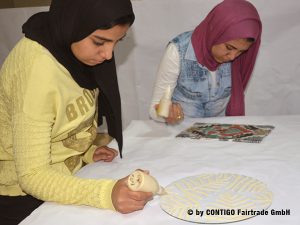
- Paid holidays (one week of recreation leave + paid national and religious holidays)
- Continuous payment of salary in case of sickness or accident
- Contributions to health insurance are paid
- In case of need: payment of further medical expenses
- In case of need (e.g. for family affairs): loans or advance payments are available, individual reimbursable plan
Occupational safety
- All safety standards are met
- Working uniforms, protective clothing and safety glasses are provided
Transparency
- Payroll is available
- Pay slips are available
- SAR (Self Assessment Report) was duly submitted to CONTIGO
Monitoring
- Personal visit in Cairo (2020)
- Glass Style visits the CONTIGO headquarter in Göttingen (2019)
Country information
See Encyclopaedia Britannica: Egypt
